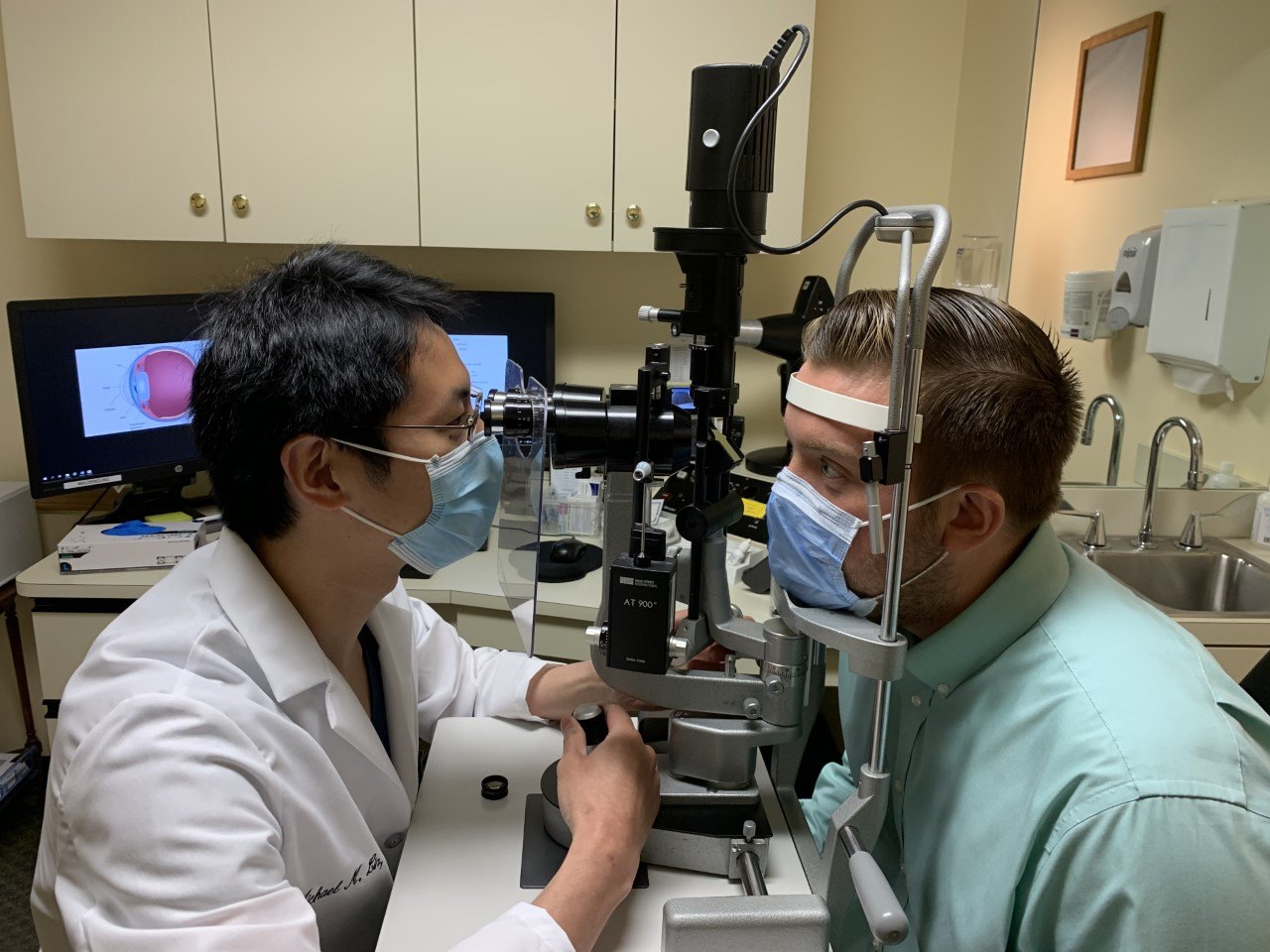The 3 Most Important Things You Can Do to Protect Your Eyesight

Photo Credit: Getty Images
It’s easy to take your vision for granted. Yet, surveys show that vision is the sense that people fear losing the most. Many eye diseases like cataracts (clouding of the lens that occurs with age) and glaucoma (a type of damage to the optic nerve) are often difficult for people to notice because they progress slowly and painlessly over many years. While everyone is at risk for eye disease, you can take several steps to help lower your risk and protect your eyes from vision-threatening problems.

Dr. Michael Lin with a patient.
As an ophthalmologist and glaucoma specialist at Massachusetts Eye and Ear, Michael M. Lin, MD, knows a thing or two about how to keep your eyes healthy. Here’s what he says are three steps you can take to protect your vision long-term.
Watch Your Diet
Developing good eating habits isn’t just proven to promote your overall health. It’s also a powerful and effective way to ward off vision problems. Maintaining a healthy weight can lower your odds of type 2 diabetes, the leading cause of blindness in working-age adults.
“Poor nutrition can definitely affect your eye health,” says Dr. Lin. “Maintaining a healthy diet and controlling your blood sugar and blood pressure now are not only important for your overall health, but they are key to avoiding eye issues later on in life.” Development of type 2 diabetes is often related to diet and exercise, and diabetes can lead to earlier formation of cataracts and problems with the retina, the part of the eye that detects light and sends signals to the brain for vision.

Photo Credit: Getty Images
Not sure what to shop for? Try adding these nutrient-rich foods to your grocery list to reduce your risk of vision problems.
- Fish, particularly salmon and tuna
- Non-meat protein sources like eggs, nuts, and beans
- Citrus fruits
- Green leafy vegetables
- Lean meat and poultry
Wear Your Sunglasses
Putting on the right pair of shades on sunny days does way more than keep you comfortable at the beach. Sunglass lenses with proper UV protection also limit exposure to the sun’s ultraviolet rays, which can speed up the development of cataracts and increase the risk of macular degeneration, a major cause of permanent vision loss in people over age 60.

Photo Credit: Getty Images
“UV exposure from sunlight can damage your eye and can cause growths and bumps on the eye that can become irritating,” says Dr. Lin. The most common sun-related growth is a pterygium, which usually appears as a fleshy white bump growing on the side of the cornea closer to the nose. “Wearing sunglasses in bright conditions is a simple step that many people already do, and the good news is that in addition to keeping your eyes comfortable, it can limit your risk of developing eye problems.”
Schedule an Eye Exam
Even if you aren’t experiencing any vision loss, a regular eye exam is key to spotting eye diseases early on and getting the right treatment. Dr. Lin says a routine eye screening with an optometrist who tests your vision and checks your eyes for diseases should be done every one to two years. Those reaching age 40—particularly if they have a family history of eye disease—should schedule a comprehensive eye exam. During a comprehensive eye exam, a doctor will have you undergo a series of tests to completely evaluate the health of your eyes and vision.
“My advice is to schedule an eye exam at age 40 and start having your eye health monitored closely by an optometrist or general ophthalmologist,” says Dr. Lin. “Taking this step can help us catch eye diseases like cataracts, glaucoma, and diabetic retinopathy earlier on, which is important because treating these diseases at early stages is easier and better for your vision than waiting until advanced stages to get care.”

Dr. Lin is quick to point out that following these three tips doesn’t guarantee that your eyes will stay disease-free. Thanks to innovations in eye care, though, he says most of his patients suffering from glaucoma and other eye diseases maintain good working vision for their entire lives, and patients who undergo cataract surgery are often seeing much better the same day after surgery. Helping patients see better and protecting their vision, he says, is the most rewarding part of his job.
“One of the top reasons being an ophthalmologist is so fulfilling is that with certain procedures like cataract surgery, we can help patients go from being barely able to see the big E on the chart one day to 20/20 vision the next day,” says Dr. Lin. “No matter what your eye problem is, we’re going to be with you to manage it. In many cases, we can protect your vision from getting worse, and we can often make your vision better so that you can get back to your normal life.”
To learn more about how to maintain good eye health and to schedule a comprehensive eye exam, visit masseyeandear.org or call 617-573-3202. Currently at Mass Eye and Ear, many services and specialties are also offering virtual appointments for new and established patients. For more information, visit MassEyeAndEar.org/virtual-visits. Mass Eye and Ear has ophthalmology locations that include Boston (Main Campus and Longwood), Malden, Stoneham, and Waltham.
This is a paid partnership between Massachusetts Eye and Ear and Boston Magazine


